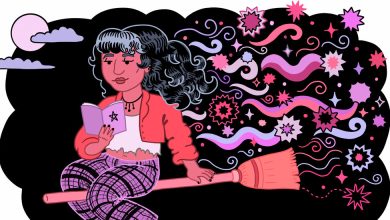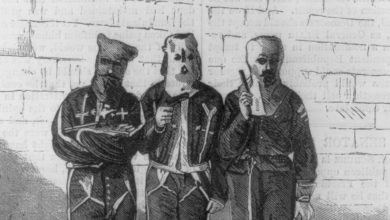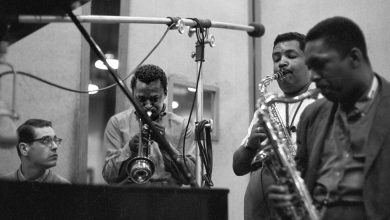In ‘Landscapers,’ True Crime Meets Hollywood Fantasy

A typed fan letter signed by Gary Cooper. A limited edition poster of “High Noon.” Some rare postage stamps featuring Frank Sinatra. These were just some pieces of the thousands of dollars’ worth of Golden Age Hollywood memorabilia that Christopher and Susan Edwards had amassed by the time they turned themselves over to police in London on Oct. 30, 2013.
The reclusive British couple, who were convicted the next year of murdering Susan’s elderly parents and sentenced to a minimum of 25 years in prison, are now the subjects of a tragicomic four-part television drama that leans surprisingly heavily on their Hollywood fixation. It was a consuming obsession financed, according to prosecutors, by the more than 285,000 pounds (more than $475,000 at the time) the couple stole from Susan’s parents after killing them.
“Landscapers,” which premieres Monday on HBO and will air weekly, is so named because a judge concluded that Christopher Edwards killed his in-laws, at his wife’s insistence, and then buried their bodies in their back garden, planting shrubs atop the makeshift grave, where they lay undiscovered for 15 years. (The couple has always maintained that it was Susan’s mother who killed her father and that Susan then shot her mother.)
The series, which stars Olivia Colman and David Thewlis as Susan and Christopher, is the first scripted drama to be written by Colman’s husband, Ed Sinclair, an actor and producer. “I studied law at university and have always been interested in what makes people commit crimes,” Sinclair, 50, said in a recent video call. “So there was this idea of reopening the case in a more human way, because criminal justice by necessity has to see things in a very black-and-white way in terms of pure criminal guilt or not.”
In a stylistic choice that may polarize viewers, Sinclair opted to explore the couple’s interior lives through the prism of Susan Edwards’s unusually fertile, movie-fueled imagination. The series is intercut with scenes from Susan’s favorite Hollywood movies, notably “High Noon,” whose hero (played by Gary Cooper) she associates with her husband’s staunch loyalty. There is also a lengthy sequence in which Susan imagines herself and Christopher as outlaws being hunted down by a posse dressed in Western garb.
Such flights of fancy reflect the real couple’s behavior: One of many outlandish details to emerge during the trial was that Susan once tried to raise her husband’s spirits, after his brother died, by sending him letters that she pretended were from the French actor Gérard Depardieu, one of Christopher’s favorite movie stars.
But the result of these quirky elements is less a true-crime dramatization than a fantastical exploration of an emotionally fragile criminal whose misdeeds appear to have been driven by a sense of her own victimization. If this approach creates a surprising amount of sympathy for convicted murders, Sinclair also sees it as a valid way to plumb the mysteries of human motivation.
He attempted to deepen his understanding of the couple by establishing a correspondence with Susan and Christopher through Susan’s solicitor, Douglas Hylton, who is played in the series, a coproduction of HBO and Britain’s Sky by the British actor Dipo Ola.
“One of the things I discussed in my first letter to Susan was that there were some things in this story that were hard to believe and frankly comical, and she agreed,” Sinclair said. “She was definitely aware of that.”
The letters gave Sinclair a chance to add texture to the couple’s back story, but there was no discussion of the crime. (Sinclair asked the Edwardses about the killings in at least one letter, but they told him later that they never received it, he said.) In the script, Sinclair homed in on accusations Susan had made that her father sexually abused her. These allegations, which the judge said he believed during the trial, provided Sinclair with the “emotional heart” of his story.
“I always had this idea that Susan’s childhood experience meant that she was essentially an alien who landed on earth aged 11, when the abuse stopped,” he said.
Colman, 47, whose performance as Queen Anne in “The Favourite” (2019) won her an Academy Award for best actress, plays Susan as an unfailingly polite woman with a fragile grasp on reality.
“I have heard of many stories of women, in particular, who have taken a life because they have been at the hands of an aggressor or been tortured, or victims of domestic violence for years, sometimes decades,” she said in a recent telephone interview. “Humans get to the point where they snap.”
One of the biggest challenges about the role, which the actress found exciting, was having to segue between reality-based scenes and the alternative fantasy universe that Susan has dreamed up for herself.
“I think with a survivor of childhood abuse, the fact that they’ve kept going — there’s got to be an enormous strength in there,” she said. “I can really understand why you would want to go into an imaginary world.”
Bringing this imaginary universe to life was the task of the Japanese-English filmmaker Will Sharpe, who directed all four episodes. Sharpe, 35, had already directed Colman in two seasons of the British television series “Flowers” and in the recent biopic “The Electrical Life of Louis Wain.” He stepped in after Alexander Payne, the original director, withdrew.
Sharpe used a variety of techniques to express the vagaries of Susan’s imagination and Walter Mitty-like existence. These included colored lens filters, dramatic re-enactments of past events told from multiple perspectives and heightened romantic scenes in which Christopher and Susan are presented as idealized Hollywood versions of themselves.
“I was trying to understand Susan as somebody who found herself in a reality where she felt a bit trapped and was longing for some kind of freedom,” Sharpe said in a recent video interview. “Maybe what she got from these films and the open plains of the Wild West was some sense of fleeting freedom.”
Sharpe, who has bipolar II disorder, has shown in series like “Flowers” (which he also wrote and acted in) that he is attracted to characters who exist on the fringes and who struggle with mental health problems.
“I want to understand the world from their point of view, rather than just dismiss them as people who are oddballs,” he said.
The director felt himself drawing on his own feelings of alienation. “Another factor is having moved to the U.K. from Japan when I was a kid,” he said. “Or maybe just being mixed-race means that in Japan I feel British, and here I feel Japanese. It means that I don’t feel completely somewhere, if that makes any sense.”
Sinclair credits Sharpe for “finding a visual language for the psychological elements and I suppose the mental health elements of this show.” Both saw the comic aspects of the story as a way to balance out its darker themes.
“I think that my natural bent is to look for humor in things,” Sinclair said. “It’s partly out of an English embarrassment of talking about anything too serious.” At the same time he does not want audiences to over-empathize with Susan and Christopher.
“They committed, in all likelihood, terrible crimes,” he said. “There’s no escaping that, and there are surviving relatives of the victims. I hope that this is not too upsetting for them to watch.”
But while his aim was not to rehabilitate the couple’s image, he concluded that humanizing them could be productive, from a dramatic standpoint.
“I kept asking myself what makes us do certain things,” he said. “How much agency do we have over what we do? I thought that was an interesting enough question to ask to justify taking a sympathetic approach to the perpetrators.”





